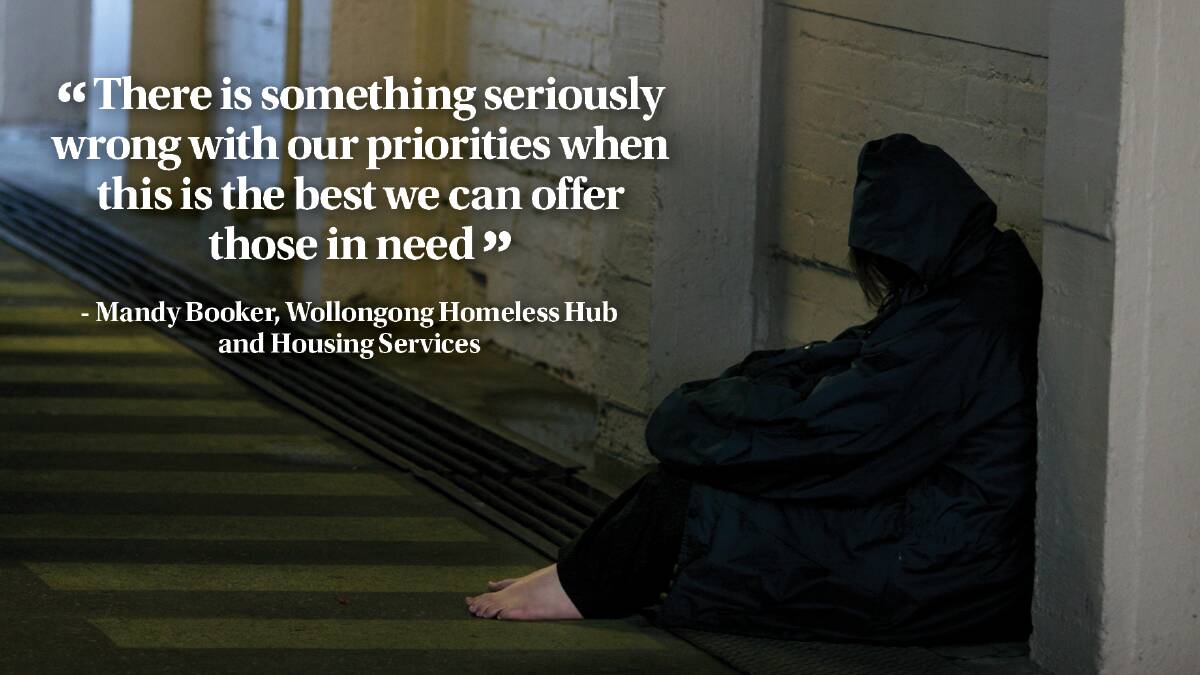
Illawarra organisations providing support to homeless people are experiencing huge waitlists and crisis accommodation is at capacity as demand for help escalates across the country.
Subscribe now for unlimited access.
$0/
(min cost $0)
or signup to continue reading
Data from Homelessness Australia shows 24,730 people sought assistance in NSW in March - an increase of over 10 per cent on last December, or an extra 2298 people.
Across Australia there was a jump of 7.5 per cent.
Wollongong Homeless Hub and Housing Services chief Mandy Booker said the number of people accessing the service, as well as those the hub's outreach team had seen living out of cars and campsites had increased.
Sections of the community who had never been at risk were now experiencing homelessness for the first time, she said.
"We will always try to offer some level of support, however we are unable to support people into accommodation options with us as they are frequently at capacity," she said.
"It is outrageous that we have children unable to attend school and preschool because they do not have a stable roof over their heads, and any connection to friends and family and education is being lost as they move to crisis accommodation outside of where they were located.
"There is something seriously wrong with our priorities when this is the best we can offer those in need."
She said the situation was the result of decades of neglect and the sale of social housing, as well as rental affordability, people leaving abuse or violence, and those who had not found a new home after the end of a lease.
Supported Accommodation and Homelessness Services Shoalhaven Illawarra (SAHSSI) interim CEO Diane Manns said her waitlist was also "huge" and "not getting any better".
Last week there were about 140 people waiting for help, with 89 in need of crisis accommodation facing a wait time of about five weeks.
Ms Manns said this meant these people - mainly women and children affected by domestic violence - were staying with friends and family, and in desperate instances, even returning to the perpetrator of the violence.
In the Shoalhaven, SAHSSI operates a homeless hub where donated tents and sleeping bags "go out as fast as they come in".
Ms Manns said the cost of housing was so high that many found it difficult to afford rent, while the rising cost of living and interest rates also presented roadblocks.
She said there was extra state government funding for case workers to address a surge in domestic violence during the pandemic, but that they were no longer funded even though the number of people needing assistance had not dropped.
"We don't have the resources to provide the services," Ms Manns said.
Both women expressed concern that the proposed $10 billion Housing Australia Future Fund - which would deliver 30,000 social and affordable homes in the first five years, including 4000 for women and children at risk of domestic violence - had stalled.
Ms Booker said she invited the politicians who had blocked the legislation to join her frontline staff and "explain to the 13 children currently in our crisis accommodation and the 57 children in transitional accommodation why they do not have a home to go to".
"Another generation that will pay for our mistakes," Ms Booker said.
A week to take action
August 7 to 13 marks Homelessness Week and this year's theme is: "It's time to end homelessness".
Homelessness Australia says this requires responses to the reasons that people become homeless, including:
- adequate incomes
- access to affordable housing
- pathways for victim-survivors of domestic violence to escape to a safe home or have the perpetrator leave the home
- ongoing support for children in out-of-home care and youth justice
- support for older people in housing crisis;
- and financial assistance and counselling for those in crisis
The organisation says homelessness services also need significant increases in service capacity to help those who do become homeless, which requires substantial government investment - services now have to turn away almost 72,000 people each year.
Federal Housing and Homelessness Minister Julie Collins on Monday released an issues paper as the government seeks feedback on what the future National Housing and Homelessness plan should include, with submissions open until September 22.
"Through the National Housing and Homelessness Plan, we will set out how these issues can be tackled head on by governments across the country with short, medium and long-term reforms," the minister said.
People are asked to consider how governments and service providers can reduce homelessness, how governments can support better housing outcomes for Indigenous people, how to improve access to social housing, sustainable housing, and other issues.
Homelessness Australia says the plan is an "important opportunity" and if the government sets a goal to end homelessness and establishes targets over time, the reform needed could be achieved.
The federal government says the plan will build upon other measures, including the planned Housing Australia Future Fund, a $2 billion social housing fund, and the extension of the National Housing and Homelessness Agreement.
Meanwhile NSW Housing and Homelessness Minister Rose Jackson said one of her first decisions as minister was granting a two-year extension of specialist homelessness services contracts.
Ms Jackson said the government had increased the initial period of temporary accommodation for people in crisis from two to seven days and removed the annual 28-day cap; increased the assets limit from $1000 to $5000 when assessing eligibility; and removed the assets limit entirely for people escaping domestic violence.
She said the government was also building new women's refuges to 2026 to provide shelter and support to an extra 2900 women and children.
Reading this on mobile web? Download our news app. It's faster, easier to read and we'll send you alerts for breaking news as it happens. Download in the Apple Store or Google Play.


